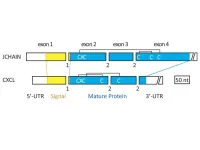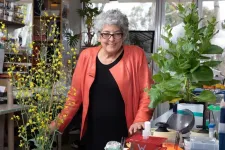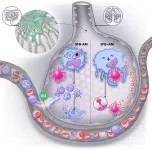(Press-News.org) Images
New, nontoxic materials could one day keep solar panels and airplane wings ice-free, or protect first responders from frostbite and more, thanks to a new University of Michigan-led project funded by the Defense Advanced Research Projects Agency.
The research team will study biological molecules used by other living things to survive freezing temperatures. The project officially begins this week and includes researchers from Raytheon Technologies, North Dakota State University and the University of Minnesota.
Existing materials used to accomplish these feats come with serious downsides. For instance, road salts prevent pavements and streets from freezing but also corrode concrete and enter natural freshwaters through runoff, to the detriment of aquatic life.
Spraying planes with de-icing fluids ensures that winter flights stay safe, but the chemicals in such fluids are toxic and can also pollute waterways. And some of what the researchers aim to make with the up to $11.5 million project has no current analogue, like a lotion that protects from frostbite without heavy winter layers.
"For the past seven or eight years now, my group has been making surfaces that have very low adhesion to ice. Such ice-shedding coatings can be very useful for a number of applications such as wind turbines, power lines or airplane wings," said Anish Tuteja, the project's principal investigator and a professor of materials science and engineering at the University of Michigan.
"However, for many other applications, it would be beneficial to completely eliminate ice formation. Preventing ice formation for hours on end in freezing conditions has thus far been very challenging to achieve."
The project aims to find molecules that can be used to manipulate ice and snow in several ways, including changing the temperature at which water freezes, increasing and decreasing how strongly ice adheres to surfaces, changing the structure of the formed ice and inhibiting or encouraging ice crystals to grow on surfaces.
To meet their goals, the research team is looking to plants, animals and microbes for inspiration. Many organisms produce molecules that allow them to survive freezing solid or stop their bodies from freezing. Wood frogs, for example, produce antifreeze lipids that prevent ice from damaging their cell membranes when they freeze over the winter.
Other organisms produce "ice-nucleating" molecules that stimulate ice to form at warmer than usual temperatures. The bacterium Pseudomonas syringae produces ice-nucleating proteins to freeze plant leaves. The ice helps break apart plant cells so that the bacterium can access the nutrients inside.
By creating and mixing these natural molecules in the lab, the researchers hope to find less toxic and biodegradable alternatives to today's de-icing chemicals as well as molecular cocktails that could enable brand new technologies.
"If you combine the molecules in the right ratios, the freezing point can decline more than what would be achievable by each molecule individually," Tuteja said.
When starting from even a small subset of known molecules, the number of possible combinations and ratios can become unwieldy. The research team must measure the effectiveness of over 5,000 different ice-forming and antifreeze molecules within the first year of the project. That number could double or triple as the project progresses.
To quickly study these molecular combos, the team plans to build an automated platform to determine the freezing temperatures of as many as 1,500 samples a day. The team hopes to narrow its search down to the 30 most promising candidate molecules for further study by the end of their first year.
In the second year of the project, the team will test each candidate molecule's safety and toxicity as well as its effectiveness at larger scales and in several forms, such as liquids, creams and coatings.
These experiments will not only help the researchers find the best antifreeze and ice-forming mixtures—the large dataset will also help reveal how different ice-forming and ice-inhibiting molecules do their jobs.
"Once we start to gather a lot of data on how these molecules work, we will work with machine-learning experts who will be able to determine which parts of the molecule might be modified to further improve their performance," Tuteja said.
END
Beating the freeze: Up to $11.5 million for eco-friendly control over ice and snow
Taking a page from nature's book could allow humans to mitigate subzero temperatures without harming the environment
2024-01-30
ELSE PRESS RELEASES FROM THIS DATE:
A tie between the most common obesity surgeries
2024-01-30
The two most common obesity surgeries – gastric bypass and gastric sleeve – have few short-term complications and are equivalent in that sense. These are the findings of a study conducted at the University of Gothenburg.
Every year, around 5,000 obesity surgeries are performed in Sweden. The person undergoing surgery will normally have a BMI of at least 40, or 35 if they also have other serious medical conditions related to obesity.
The most common procedures are gastric bypass, where a large part ...
Study provides new explanation for why placenta may not properly separate at birth, putting mother and newborn at risk
2024-01-30
A new study led by researchers at UCLA may change the way clinicians and scientists understand, diagnose and treat placenta accreta spectrum disorder, a serious condition in which the placenta fails to separate from the uterus at birth, jeopardizing the life and health of both mother and baby.
Researchers previously believed that certain overly invasive placental cells, called trophoblasts, were responsible for keeping the connection intact. But this new research, which identifies genetic and cellular changes within single cells where the placenta ...
Ethnic disparities in cancer mortality in the capital and northeast of the State of São Paulo, Brazil
2024-01-30
Although the interior of São Paulo state (Brazil) has higher human development indices (HDIs) and fewer Black people as a percentage of the population, they account for a larger proportion of deaths from cancer in the Barretos region than in São Paulo city, the state capital, according to a study supported by FAPESP. An article on the study is published in the journal Cancer Causes & Control.
In the 18 cities of the Barretos regional health district (RHD), the number ...
Evolutionary origin of mysterious immune system molecule in humans revealed
2024-01-30
UNIVERSITY PARK, Pa. — Biological systems can behave as siblings in several ways, including by borrowing something and never giving it back. That appears to be what the human immune system did with a protein that now helps bind and regulate the subunits that make up antibodies, according to a multi-institute research collaboration. They found that, before the immune system evolutionarily co-opted it, the protein originally belonged to gene family responsible for directing cells to move to the right location at the right time to address specific functional needs.
The researchers, including Kazuhiko Kawasaki, associate research professor of ...
UCSF scientist wins Barancik Prize for Innovation in MS Research
2024-01-30
[New York, January 30, 2024] – Sergio E. Baranzini, PhD, a geneticist, neuroimmunologist and data scientist at the University of California, San Francisco, is the winner of this year’s Barancik Prize for Innovation in MS Research. Dr. Baranzini is being recognized for his pioneering efforts to integrate vast pools of information to understand complex mechanisms that cause MS and to develop more precise approaches to stop the disease and end it by prevention.
Baranzini is a Distinguished Professor and holds the Heidrich Friends and Family endowed chair in Neurology at the University of California, San Francisco ...
Salk Professor Joanne Chory honored with Benjamin Franklin Medal in Life Science
2024-01-30
LA JOLLA (January 30, 2024)—Salk Institute Professor Joanne Chory has been selected by the Franklin Institute in Philadelphia to receive a Benjamin Franklin Medal in Life Science for her achievements in plant science. She will receive a 14-karat gold medal and a $10,000 honorarium at the Franklin Institute Awards Ceremony in April 2024. Chory joins other extraordinary scientists and engineers as a Franklin laureate, including Nikola Tesla, Marie and Pierre Curie, Thomas Edison, Albert Einstein, and Jane Goodall, among others.
“Joanne’s contributions to the field of plant biology have impacted and will continue to impact scientists around the world,” ...
Study finds gut microbiota influence severity of respiratory viral infection
2024-01-30
The composition of microbiota found in the gut influences how susceptible mice are to respiratory virus infections and the severity of these infections, according to researchers from the Center for Translational Antiviral Research in the Institute for Biomedical Sciences at Georgia State University.
The findings, published in the journal Cell Host & Microbe, report that segmented filamentous bacteria, a bacterial species found in the intestines, protected mice ...
Smartphone-based shopping mall walking program and daily walking steps
2024-01-30
About The Study: This study found that the use of a smartphone-based mall walking program combined with physical shopping mall facilities and lottery-based digital incentive coupons may motivate people to increase their daily number of walking steps.
Authors: Masamichi Hanazato, Ph.D., of Chiba University in Chiba-shi, Chiba, Japan, is the corresponding author.
To access the embargoed study: Visit our For The Media website at this link https://media.jamanetwork.com/
(doi: 10.1001/jamanetworkopen.2023.53957)
Editor’s ...
Comparison of sleeve gastrectomy vs Roux-en-Y gastric bypass
2024-01-30
About The Study: This randomized clinical trial of 1,735 patients undergoing primary bariatric surgery found that both laparoscopic sleeve gastrectomy and laparoscopic Roux-en-Y gastric bypass were performed with a low perioperative risk without clinically significant differences between groups.
Authors: Suzanne Hedberg, M.D., Ph.D., of the University of Gothenburg in Gothenburg, Sweden is the corresponding author.
To access the embargoed study: Visit our For The Media website at this link https://media.jamanetwork.com/
(doi: 10.1001/jamanetworkopen.2023.53141)
Editor’s Note: Please see the article for additional information, including ...
Worries about costs, time off work and COVID-19 kept some older adults from having surgery
2024-01-30
When it comes to having surgery, older adults don’t just base their decision on how much pain they’ll feel and how quickly they’ll recover, a new study finds.
Many also have serious concerns about how much they’ll have to pay out of their own pockets, how much work they’ll miss, and whether they’ll catch COVID-19 in the hospital or surgery center.
And a majority of those who called themselves very concerned about these issues ended up not having an operation that they had considered having, the study finds. The percentage who didn’t go through with surgery was much lower among those who said they’d been very concerned about pain or the ...
LAST 30 PRESS RELEASES:
Green hydrogen without forever chemicals and iridium
Billion-DKK grant for research in green transformation of the built environment
For solar power to truly provide affordable energy access, we need to deploy it better
Middle-aged men are most vulnerable to faster aging due to ‘forever chemicals’
Starving cancer: Nutrient deprivation effects on synovial sarcoma
Speaking from the heart: Study identifies key concerns of parenting with an early-onset cardiovascular condition
From the Late Bronze Age to today - Old Irish Goat carries 3,000 years of Irish history
Emerging class of antibiotics to tackle global tuberculosis crisis
Researchers create distortion-resistant energy materials to improve lithium-ion batteries
Scientists create the most detailed molecular map to date of the developing Down syndrome brain
Nutrient uptake gets to the root of roots
Aspirin not a quick fix for preventing bowel cancer
HPV vaccination provides “sustained protection” against cervical cancer
Many post-authorization studies fail to comply with public disclosure rules
GLP-1 drugs combined with healthy lifestyle habits linked with reduced cardiovascular risk among diabetes patients
Solved: New analysis of Apollo Moon samples finally settles debate about lunar magnetic field
University of Birmingham to host national computing center
Play nicely: Children who are not friends connect better through play when given a goal
Surviving the extreme temperatures of the climate crisis calls for a revolution in home and building design
The wild can be ‘death trap’ for rescued animals
New research: Nighttime road traffic noise stresses the heart and blood vessels
Meningococcal B vaccination does not reduce gonorrhoea, trial results show
AAO-HNSF awarded grant to advance age-friendly care in otolaryngology through national initiative
Eight years running: Newsweek names Mayo Clinic ‘World’s Best Hospital’
Coffee waste turned into clean air solution: researchers develop sustainable catalyst to remove toxic hydrogen sulfide
Scientists uncover how engineered biochar and microbes work together to boost plant-based cleanup of cadmium-polluted soils
Engineered biochar could unlock more effective and scalable solutions for soil and water pollution
Differing immune responses in infants may explain increased severity of RSV over SARS-CoV-2
The invisible hand of climate change: How extreme heat dictates who is born
Surprising culprit leads to chronic rejection of transplanted lungs, hearts
[Press-News.org] Beating the freeze: Up to $11.5 million for eco-friendly control over ice and snowTaking a page from nature's book could allow humans to mitigate subzero temperatures without harming the environment





